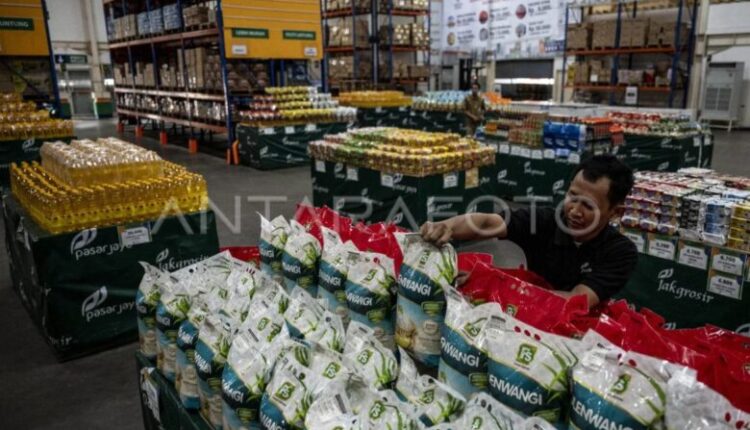Appreciating the Acceleration of the UMKM Class Up Program Under President Prabowo’s Leadership
By : Luthfi Pranama
The program to accelerate the upgrading of MSMEs is one of the main priorities of President Prabowo Subianto’s leadership. The government considers that Micro, Small and Medium Enterprises (MSMEs) are the backbone of the national economy, especially in encouraging economic growth for small communities and maintaining economic stability amidst global challenges.
Through an integrated and collaborative approach, various strategic steps have been formulated to ensure that MSMEs are able to move up a class, have high competitiveness, and contribute more to the national economy.
In its development, the government focuses on increasing the competitiveness of MSMEs through various real programs, one of which is maximizing the digital ecosystem. Minister of SOEs Erick Thohir emphasized that three strategic steps have been prepared, namely the utilization of the MSME digital market ecosystem (PaDi), strengthening the PNM Mekaar program database, and accelerating the digitalization of MSME database synergy.
Erick also mentioned that these programs aim to connect MSMEs with wider market access, both domestic and global. In addition, the PNM Mekaar program, which has reached more than 21 million small business actors in villages, especially mothers, has proven its success in providing business capital financing between IDR 1 million and IDR 5 million.
In an effort to improve the quality of MSME products, collaboration with the Food and Drug Supervisory Agency (BPOM) is also an important step. Through this collaboration, the government encourages MSME products to meet BPOM standards so that they can penetrate national and international markets.
President Director of PT Permodalan Nasional Madani (PNM), Arief Mulyadi, emphasized that BPOM certification is very important to increase competitiveness and consumer trust in MSME products.
In addition to providing financial capital, PNM also focuses on providing assistance in the form of education about the importance of licensing, especially for food, beverage, and herbal products. With a better understanding of distribution permits, it is hoped that MSME products can develop from subsistence businesses to businesses that are oriented towards a broad market.
Efforts to expand the market for MSMEs are also carried out through the “MSMEs Can Export” program initiated by the Ministry of Trade. This program is designed to encourage MSME products to be able to compete in the international market through strategies involving universities, the private sector, and the government.
In the National Export Discussion Forum activity, the Minister of Trade, Budi Santoso, emphasized that synchronizing coaching activities between various stakeholders is the key to success in developing MSME product exports.
The role of Indonesian trade representatives abroad is also maximized to help promote MSME products so that they can reach the global market more effectively.
Furthermore, the Minister of Trade hopes that through the UMKM BISA Ekspor program, synchronization of coaching activities by stakeholders can be created to support UMKM BISA Ekspor. In addition, it can also strengthen the ecosystem and policies of UMKM BISA Ekspor by embracing all relevant stakeholders.
The government also recognizes the importance of digitalization in bringing MSMEs up a class. By utilizing digital technology, MSMEs have the opportunity to expand their market significantly. The digitalization program initiated by the Ministry of SOEs is one of the real efforts in connecting MSMEs with the market through online platforms.
Through the training and mentoring provided, the government seeks to ensure that MSMEs have the skills needed to manage their businesses digitally and competitively.
In addition, access to financing through the People’s Business Credit (KUR) program continues to be strengthened as a form of government support for MSMEs. KUR is an important instrument for providing business capital with lower interest rates, so that MSMEs can grow faster.
The government is also encouraging bureaucratic simplification in financing applications so that small business actors can more easily access the credit. This step is expected to increase the productivity of MSMEs and have a positive impact on the economy of the community at the grassroots level.
President Prabowo also pays great attention to the agriculture and fisheries sectors as part of the MSME ecosystem. These two sectors have been the pillars of the small community economy for years, but often face obstacles in market access and financing.
The government’s affirmative policies, such as adjusting credit payment terms and amnesty for bad debts, are concrete evidence of support for small business actors in this sector. These steps are expected to help MSMEs in the agriculture and fisheries sectors to recover after being affected by the economic crisis and the Covid-19 pandemic.
Simplifying regulations is also a focus of the government in supporting MSMEs to move up a class. A faster and more efficient licensing process will make it easier for MSMEs to develop their businesses.
With a bureaucracy that is more friendly to MSMEs, the government provides the legal certainty that business actors need in marketing their products, both domestically and in international markets.
Through these strategic steps, the government under the leadership of President Prabowo Subianto has demonstrated its commitment to accelerating the growth of MSMEs. Efforts to increase capacity, market access, assistance, and digitalization are a strong foundation in bringing MSMEs into a new era that is more advanced and highly competitive.
With full support from various parties, the MSME acceleration program is expected to create an inclusive and equitable economy, so that people’s welfare can continue to increase.
)* The author is a contributor to the Jendela Baca Institute
